#maria rushworth
Text
The thing about the Maria and Henry scandal is that it was so stupidly avoidable. Over and over again, they were given the opportunity to not do what they did. Sir Thomas gave Maria full agency to go back on her engagement when he saw that she didn’t love Rushworth, but she didn’t. Henry didn’t need to go to London and see Maria, but he did. Maria was cold to him because she wanted nothing more to do with him and he didn’t walk away. He pressed on. He didn’t even want to have an affair — he was in love with Fanny! He had exactly zero need to fall in with Maria again and yet he did. And she gave the final push. It’s like a Greek tragedy. At once so avoidable and so unavoidable.
#smashing vases it was the dumbest thing in the history of dumb things#the man already left you once maria!!!#what exactly did you think was going to happen???#lydia bennet at least ran away because she thought she was about to get married#but maria already had a husband so what was even her plan#and don’t get me STARTED on crawford#did he think that he’s somehow still be able to marry fanny after all that??#at what point do you think he realized he’d lost her#mansfield park#henry crawford#maria rushworth#jane austen#elly's posts
73 notes
·
View notes
Note
After her affair with Henry Crawford, Maria is sent to “another country”. Which country do you think it was? The problem with her being sent to anywhere in continental Europe is that Jane Austen was writing Mansfield Mark during the Napeoleonic Wars, and war in Europe had been ongoing for nearly 25 years at this point (though it was soon to end). Is Austen anticipating the end of the wars? Is she ignoring them (in the same way that contemporary writers during the COVID pandemic would not necessarily depict their characters as living during the pandemic)? Or is she thinking of Maria being somewhere else?
I am pretty darn sure Maria is still in the United Kingdom (whatever that was at the time), here is the relevant quote:
It ended in Mrs. Norris’s resolving to quit Mansfield and devote herself to her unfortunate Maria, and in an establishment being formed for them in another country, remote and private, where, shut up together with little society, on one side no affection, on the other no judgment, it may be reasonably supposed that their tempers became their mutual punishment. (Ch 57)
The meaning of "country" is more vague in Austen than it is today. According to Etymoline:
mid-13c., "(one's) native land;" c. 1300, "any geographic area," sometimes with implications of political organization, from Old French contree, cuntrede "region, district, country,"... Also from c. 1300 as "area surrounding a walled city or town; the open country." By early 16c. the word was applied mostly to rural areas, as opposed to towns and cities. Meaning "inhabitants of a country, the people" is from c. 1300.
I'm pretty certain that what this sentence means is another "county" or shire, other than Northamptonshire, within England.
Some examples of Austen using country. Bingley is asked if he'll stay in the country, which likely means stay in a rural area/Hertfordshire, while Mr. Bennet calls his daughters the silliest in the country, which may mean England or Hertfordshire.
This quote seems modern use, but it's actually using country to talk about the neighbourhood:
You have a sweet room here, Mr. Bingley, and a charming prospect over that gravel walk. I do not know a place in the country that is equal to Netherfield. You will not think of quitting it in a hurry, I hope, though you have but a short lease.
And the use here of "country" as coming into the rural areas:
Mr. Bingley with having promised on his first coming into the country to give a ball at Netherfield.
Anyway, I think Maria is in England, just in a shire or county far from home.
31 notes
·
View notes
Text
Mansfield Park is.
Look, I've just got huge and ever increasing parental issues, alright, and I know exactly what sort of effect a pater familias like Sir Thomas has on the kids
#i too would agree to marry an idiot like Rushworth if that was the only way to get away from my stepdad#to be honest#idk i know basically no one has any sympathy for Maria but honestly I get her#she fucks up but I get her#Idk why I'm thinking about this right now but still
3 notes
·
View notes
Text
Mansfield Park - Henry Crawford and Fanny Price
I want to lay out how I see these characters and their relationship, because to me they seem to be set up as a deliberate contrast to Pride and Prejudice. At the tine of Henry’s first proposal, they are in a similar place to Elizabeth and Darcy at the time of Darcy’s first proposal, albeit with extremely different personalities than those characters: Fanny refuses him despite his wealth and her economic precarity because she cannot like or even respect him. However, Fanny, who is far shyer than Elizabeth, cannot lay out in direct and specific terms the foundation of her disapprobation of him.
From there, Henry sets out to win her regard in ways that very closely recall some of the events between Elizabeth and Darcy.
1) He does a great favour for a relative of hers. In his case, it is getting his uncle the admiral to have Fanny’s brother William promoted to lieutenant; in Darcy’s, it is saving the Bennets from disgrace by getting Wickham to marry Lydia. Darcy’s favour is far greater, and much more personally unpleasant for him, and he keeps it intentionally secret; he does it out of love of Elizabeth, but not to make her feel obligated. Henry’s takes only a few days of his time, its goal is get to Fanny to like him better, and he leverages it both at first and later to make her feel obliged to him.
2) He changes his manners to suit her. In Darcy’s case this means being polite rather than rude and haughty; in the case of Henry, who has always been charming and gregarious, it involves softening his manners to suit Fanny’s shy and quiet personality and engaging in more serious talk. In Darcy’s case this is a fundamental change in response to Elizabeth’s reproof; in Henry’s, it’s a simple adaptation to one person’s taste rather than another. He’s intelligent and able to engage in serious conversation when he wants to, but that’s not indicative of any fundamental change in his thinking.
3) He is polite to her family (the Prices, in Portsmouth) even when they are embarrassing.
4) He speaks with Fanny about reforms he is making on his estates to make sure his tenants are being treated fairly. These feels like a parallel to Elizabeth’s improved opinion of Darcy upon visiting Pemberley and hearing how well his servants speak of him. The difference is that Darcy has always been like that, whereas we are told early in Mansfield Park that Henry has been little on his estates during his adulthood: “To any thing like a permanence of abode, Henry Crawford had…a great dislike”. Darcy is acting in line with deep-seated principles; Henry is doing it as part of his courtship of Fanny, so he can bring it up to her and look good. He also tries to get her to counsel him to continue in this current vein, to engage her in a desire to fix/improve him, which Fanny shuts down laudably: “I advise! - you know very well what is right,” and when he reples that he always knows what is right when she tells him: “We all have a better guide in ourselves, if we would attend to it, than any other person could be.” The weakness of Henry’s motivation is seen in the ending, where he puts off a visit to his estates to set matters right there in order to flirt with the now-married Maria Rushworth.
In short, Darcy is already good in many concrete ways, and sincerely improves in the ways where he is faulty, not in order to get Elizabeth to love him but because he thinks about her criticisms, agrees with them, and wants to be better for its own sake; and he helps her family solely out of love for her and deliberately hides it. Henry changes his manner and talk as part of his courtship, but his deeper values and attitudes do not change, and everything is directed at getting Fanny to fall for him.
The second area of contrast is in what the heroines object to. Elizabeth’s aspersions on Darcy’s character, regarding his interactions with Wickham, are found to be mistaken; her legitimate objections are to his attitude and arrogance, and he amends this. Henry’s manners are impeccable and his company charming; Fanny’s objections are to his character. She sees him deliberately flirt with both her cousins at once to a degree that implies an intent to propose, and play them off against one another; she sees him make some very deliberate and mutually-understood innuendo towards Maria, signifying that she should break off her engagement and be with him instead, all with zero intention of actually proposing if she did do so; she sees him use the theatricals to continue this pursuit of Maria. And this is very usual behaviour for Henry; his sister says he has broken many hearts, and when he starts courting Fanny his goal is to make her fall in love with him and then leave her “feeling she will never be happy again”.
This is what makes me judge Henry much more harshly than his sister Mary. Mary can be selfish, but she is not malicious or cruel, and she can be kind when it doesn’t inconvenience her (and one of her better traits is that even when she is unhappy or disappointed she never takes it out on other people). In contrast, Henry’s principal diversion and entertainment for years has been deliberately making young women miserable, leading them on, getting them to reject other suitors in hopes of him, and then departing without a care, to please his own vanity. He is, in truth, doing not once but habitually, what Willoughby did to Marianne: always implying enough to seem on the edge of an engagement but never following through, and then pretending it was all nothing. It’s a casual cruelty he finds amusing as a proof of his skills. In short, he’s a deceptive playboy. Even after Maria is married, he can’t resist flirting with her, which is what leads to her disgrace and social destruction.
Even though Austen lays out an alternative scenario where Henry might have married Fanny if not for that final flirtation with Maria Rushworth, all of the above does not lead me to believe she find that scenario desirable. She’s painstakingly laid out all the contrasts with her previous novel that make this scenario a very different one from Pride and Prejudice.
In addition to Henry’s serial seductions, one of the biggest red flags is his attempt to make Fanny responsible for his character, with an attitude of ‘you’re such an angel, you can make me do whatever you want’. This gives me Tenant of Wildfell Hall vibes, where Helen’s aunt tries to warn her off thinking that an older man of the world will let himself be guided and led by a younger woman who is in his power. Fanny rejects this idea: Henry knows what is right, can make his own choice to do it, and she will not let herself be appropriated as his conscience. Henry isn’t debauched like Huntington, but if Fanny married him the chances of him feeling bored after some years - when he no longer has the thrill of the pursuit to keep him interested - and pursuing other flirtations and affairs to Fanny’s misery, seems pretty high based on his character; and he’s skilled enough at skirting the line that he could easily brush away any objections from her as “oh, it’s nothing, just being sociable.”
On top of all the faults of character - even if Henry did reform, I have trouble seeing Fanny and Henry being happy together. At the core of his personality is a need for change, for stimulus, for challenge (the latter, rather than sexual desire, is the main thing driving his string of conquests), and for company. Fanny, in contrast, very much prefers quiet and the company of a few people she is close to, and I think this is her genuine personality, not something that needs to be overcome by “bringing her out of her shell”. Henry would be bored to misery living the kind of lifestyle that Fanny is comfortable with, and Fanny would be deeply unhappy living in the social whirl and flurry of activity that Henry prefers. In contrast, Fanny and Edmund are both “me after a quiet day in: time for a quiet night in” people.
So, with all this, why is Henry/Fanny a popular AU? Apart from fannish dislike of Edmund (which I don’t share), I think part of it is that we don’t get an open confrontation between Fanny and Henry, the way we do between Elizabeth and Darcy, where she lays out her objections to him: I saw you flirting with both my cousins at once, I saw you making them both unhappy for your own amusement, I saw you repeatedly tempting Maria to break her engagement with no intention of following through if she did, just because you liked the challenge of winning an engaged woman. And the lack of this naturally raises the question of: how would Henry react if this confrontation happened? Which provides fertile soil for AUs.
177 notes
·
View notes
Text
So, there's this famous quote (and source of many memes) from Northanger Abbey, where Henry Tilney says:
“and this is a very nice day, and we are taking a very nice walk, and you are two very nice young ladies. Oh! It is a very nice word indeed! It does for everything. Originally perhaps it was applied only to express neatness, propriety, delicacy, or refinement—people were nice in their dress, in their sentiments, or their choice. But now every commendation on every subject is comprised in that one word.” (chapter 14)
Indeed, Jane doesn't seem to like the word that much, at least in this novel: of the 14 times it is used, 3 happen before this exchange, 10 during it, and then one last time in chapter 29.
It appears
7 times in Pride and Prejudice (used mainly by Lydia, but also by Mrs Bennet, Mrs Gardiner and Lady Catherine);
12 in Sense and Sensibility (by sir John, Marianne, Edward, Mrs Palmer, and Mrs Jennings most of all);
17 in Emma (by Harriet, Mr Woodhouse, Emma, Miss Bates, Mrs Elton, and Mr Weston);
15 in Mansfield Park (by Mrs Grant, Mrs Norris, Mary, Tom, Mr Crawford, Maria, and Edmund);
12 in Persuasion (by Elizabeth, Wentworth, Admiral Croft, Mr Elliot, Mary
But of those, none are used by the narrator in NA; 2 in P&P; 3 in S&S; 5 in Emma; 4 in MP; and 6 in Persuasion (and I'm including all indirect speech). Very nice.
But you know what generic, vague descriptor our beloved Jane loved? fine.
NA: 33 times (18 from dialogue: used my Mrs Thorpe, Mr Allen, Mrs Allen, John Thorpe, Catherine, a miss Thorpe, Isabella, Tilney, and Mrs Morland.)
P&P: 40 times (21 in dialogue: used by Mrs Bennet, Charlotte, Lizzy, Darcy, Caroline, Mrs Gardiner, Mrs Reynolds, and Mr Bennet)
S&S: 29 times (17 in dialogue: used by Willoughby, Marianne, Edward most of all, Mrs Palmer, Anne Steele, and Mrs Jennings)
Emma: 48 times (33 in dialogue: used by Harriet, Mr Woodhouse, Mr Knightley, Emma, Miss Bates, Jane Fairfax, Mr Weston, Frank, Mrs Cole, Mrs Elton)
MP: 67 times (38 in dialogue: used by Mr Rushworth, Lady Bertram, Edmund, Mrs Norris, Fanny, Mrs Grant, Dr Grant, Mr Crawford, William, Mrs Price, Mr Price, and Mary)
Persuasion: 35 times (17 in dialogue: by Mrs Musgrove, Mrs Croft, Charles Musgrove, Sir Walter, Admiral Croft, Captain Wentworth, lady Dalrymple, Harriet Smith).
Not only is fine used much, much more than nice, but nice is most often used by silly or unrefined characters, whereas fine sees more representation of all sorts of characters, and it is used by the narrator specifically, much, much more, not only to describe weather, but to describe people, places, clothes, and so on and so forth.
So, dear Jane, I think we need to talk...
94 notes
·
View notes
Text
#polls#jane austen#mansfield park#persuasion#northanger abbey#sense and sensibility#lady susan#regency#books#book#bookbkr
73 notes
·
View notes
Text
Feedback Fest 2024 Fic Recs
To celebrate International Fanworks Day on February 15th, here’s a list of ten fanfiction recommendations! (It was so hard to pick just ten…) The recs are from various fandoms and in no particular order.
Further Up and Further In by hedda62
Fandom: Vorkosigan Saga, Chronicles of Narnia
Summary: To fill the prompt: You know all those Betan survey ships that go into wormholes and don’t come out? They go to Narnia. That... says it all.
A Glass Darkly by DaisyNinjaGirl
Fandom: North and South
Summary: “I suppose I wondered,” John said, his voice a little too light, “I wondered if anyone had taken the time to tell you—to explain—what happens between a man and a woman when they are married?”
“Mama left a letter for me.” Her eyes flickered to her dressing table, where some pages lay open. Her chin lifted. “I hope I am not a coward.”
More Likely To Want Time Than Courage by EllynNeverSweet
Fandom: Pride and Prejudice
Summary: Elizabeth Bennet and Fitzwilliam Darcy plan a quiet country wedding. Darcy’s aristocratic relatives interfere.
Hold It All At Bay by psocoptera
Fandom: Check Please!
Summary: The theory of extrapolative synchronization of the mirror neurons was debunked back when he was still in his teens, so Jack is reluctant to mention that he can smell Bitty's pies baking from across campus.
Definitions of Intimacy by AMarguerite
Fandom: Pride and Prejudice
Summary: There are many definitions of intimacy. Elizabeth explores some of them in the early days of her marriage to Darcy.
Everingham by katharhino
Fandom: Mansfield Park
Summary: A chance remark reminds Henry Crawford to do the right thing, and ride to Everingham instead of staying in London to flirt with Maria Rushworth. As a result, there is nothing to prevent Edmund from marrying Mary Crawford, or Henry from continuing his pursuit of Fanny with more determination than ever.
shield you from the waves by rain_sleet_snow
Fandom: Persuasion
Summary: In 1808, Frederick wrote to Anne. In 1814, Captain and Mrs Wentworth came to Kellynch as the guests of Admiral and Mrs Croft.
Sea-Change by Rosie J (darthmelyanna)
Fandom: Pride and Prejudice, Emma
Summary: In the summer of 1815, Elizabeth Bennet visits Weymouth with the Bingleys. There she crosses paths with Captain Fitzwilliam Darcy, newly retired from the Royal Navy and visiting his cousins at the seaside.
Righteousness and Respectability by Beatrice_Otter
Fandom: Sense and Sensibility
Summary: The Dashwood ladies are mixed race. Some things change, but others do not.
The Practice of Barrayaran Sex by Philomytha
Fandom: Vorkosigan Saga
Summary: Aral and Cordelia's wedding. And wedding night.
9 notes
·
View notes
Text
Henry Crawford is rich and he is bored. He’s always been secure in money without ever having to work for it. He has nothing to do and he craves stimulation. Mary talks over and over about how Henry always has to be doing something. On a good day, this takes the form of making improvements to his estate. But on most days, he just finds the nearest female and makes her fall in love with him to gratify his vanity. If he’d been a second son, he might have been saved. If he hadn’t been born at the top of the social hierarchy, he’d have had to work to gain money, a career, and a societal position, and we all know how much Henry loves a challenge. He could have been brilliant as a lawyer or a soldier or a sailor. He would have had something to do and would have developed at least some kind of work ethic (with related virtues) along the way. But he didn’t, so his boredom drove him to desperate--and ultimately tragic--ends.
Fanny Price is poor and she is content. She’s barely had anything to call her own, and what she does have, she values to an intense degree. She likes quiet. She likes rest. She likes isolation and time for reflection. Nature is a source of never-ending enjoyment for her because she gets joy in just watching and appreciating. She is never bored, because the tiniest tasks can keep her busy, the tiniest things can bring her joy.
Henry appreciated Fanny first and foremost because she was a challenge. She didn’t fall at his feet like other girls, so he had to work to get to know her and figure out how to appeal to her. It took time--which Henry is always trying to fill--and effort--which he has few opportunities to engage in. Along the way, he figured out that Fanny had a lot of qualities worth valuing. But even during his proposal process, Austen makes sure to mention that Fanny’s refusal increases his value to her. Having to make her love him increases the level of challenge--giving him something to strive for, something to achieve, a sense of accomplishment that will gratify his vanity. Unfortunately, Fanny’s not the only thing that can provide that level of challenge. As soon as another challenge comes his way--making Maria fall in love with him--his eternally bored heart can’t resist taking it up. His supposed devotion to Fanny was just him not having anything else to occupy his time. As soon as another distraction comes, he takes it up eagerly.
If Fanny had given in and married him, the challenge would have been over, and then what would Henry have done? Fanny would have wanted a quiet life in the country. Henry would have been bored to death. He’d probably spend a lot of time improving whatever house he bought, but one can only improve so much. He could arrange little projects to make Fanny happy, but it takes so little to make her happy that there’d be no challenge. He’d probably want a house in London, but Fanny would be miserable every moment she spent there, and every single female Henry ever came across could potentially provide a new challenge to tempt his bored mind.
Austen can tell me that Henry truly loved Fanny, but I’m inclined to believe Mary’s vision of their future--Fanny marrying Henry, and Henry engaging in flirtation with Mrs. Rushworth when they meet once a year. Henry can never be content with what he has, and Fanny would never provide enough stimulation for him. It’s a good thing Fanny never gave in, because the moment she did, she’d have lost all her value as a challenge to him.
74 notes
·
View notes
Text
Maria Bertram is engaged to a Mr James Rushworth, who is immensely rich, but also immensely stupid. Her aunt Norris loves to take the family to visit Sotherton where he lives, but Maria can hardly bear to talk to him.

Maria is much more interested in Henry Crawford, a charming sim who has been calling at Mansfield and helping Mr Rushworth renovate his estate. Julia is very interested in him too.

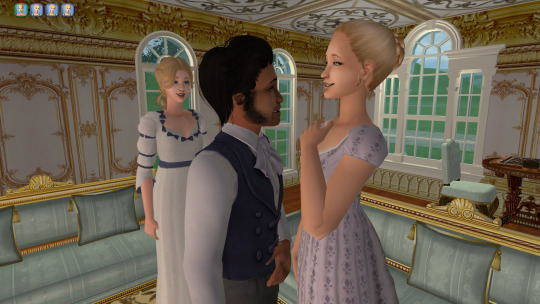
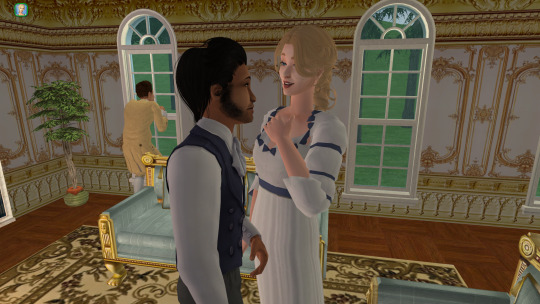
10 notes
·
View notes
Text
In other news, I blacked out earlier and woke up with this Maria Bertram playlist 🧍🏻♀️
4 notes
·
View notes
Text
Sir Thomas:
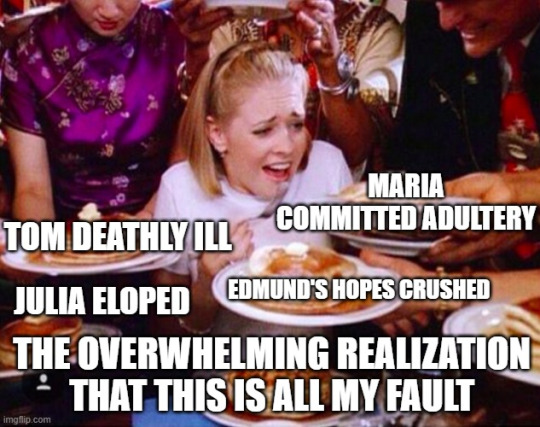
Mansfield Park Memes, Ch 47
#sir thomas#mansfield park memes#mansfield park#maria rushworth#julia yates#tom bertram#edmund bertram
89 notes
·
View notes
Text
I don't think Maria Bertram believed in romantic love as a concept before she met Henry Crawford. She doesn't really have any examples of it- Sir Thomas shows Lady Bertram respect and she shows him deference, but whatever spark might have existed there once is long gone before Fanny arrives at Mansfield. Her Aunt Norris probably spends more time at the Park than the Parsonage, we never *meet* Mr Norris- their partnership isn't going to inspire Maria with hopes of being able to emulate it. She gets engaged to Rushworth because he is rich, because he's handsome enough to look at, because her aunt wants her to and society expects it, and because she wants out of her father's house. She has no reason to think of marriage as a partnership, or anything other than a transaction that allows a woman to move in society independent of her father. And on that score, she can be pleased with the prospect that Rushworth offers her. The problem is that, unbeknown to herself as much as anyone else, Maria *is* a romantic, she *is* capable of falling hard, she just didn't have the opportunity to learn that about herself before she got engaged. And I can't help but feeling it must have come as a nasty shock when she realised, too late, that she found Crawford more than generically agreeable. Which doesn't excuse what happened- and she really should have taken the out when Sir Thomas offered it- but its fascinating to think about....
120 notes
·
View notes
Text
I like to think that Jane Austen would be pleased to know that me, a twenty-first century reader who has become long inured to the romantic drama that surrounds celebrities like paparazzi, still had her (likely expected) reaction to the developments surrounding Maria, Henry, and Julia.
*reads Mary’s letter alluding to some horrible rumor involving Henry and the Rushworths* 😲 😲 😲 What, was there a duel? Did Henry make a pass at Maria? Did they run away together? (no, that’s ridiculous, they wouldn’t do something that far beyond propriety...)
*reads the newspaper* Oh my gosh, they did!!! Well, at least this can’t get any worse-
*reads about Julia and Yates on their scandalously merry way to Gretna Green* 😱😱😱
This book has been a ride. And I still have two chapters to go!
7 notes
·
View notes
Text
Mansfield Park fancast
Sir Thomas Bertram/Charles Dance 1,91m
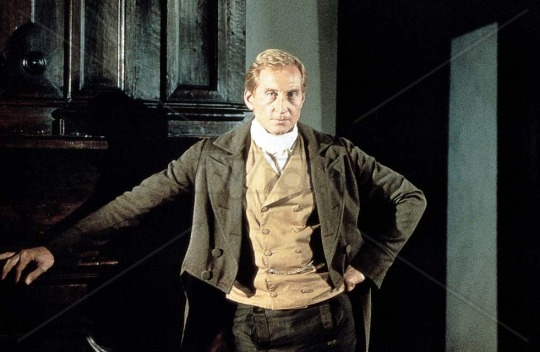
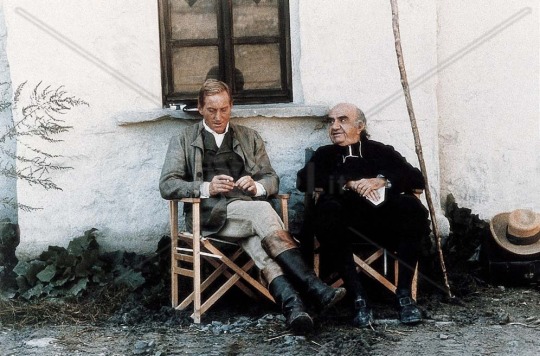
Lady bertram/Janet McTeer 1,86 m
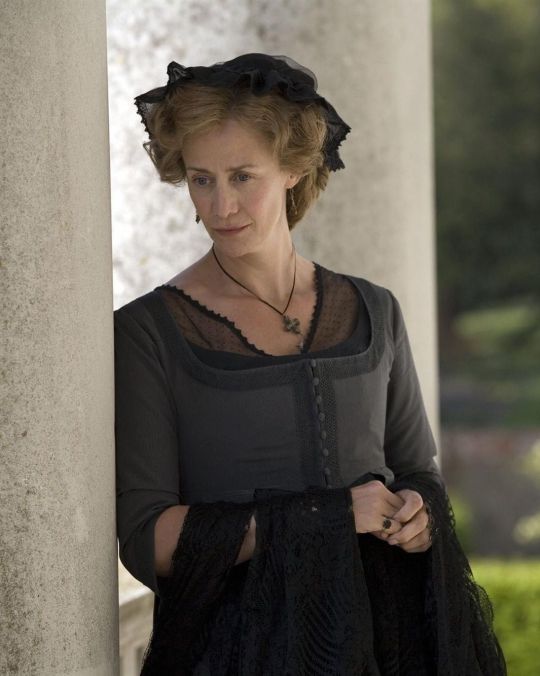

Frances Price/Maxine Peake 1,70 m

Mr Price/Jason Flemyng 1,85 m

Mrs Norris/Imelda Stauton 1,52 m
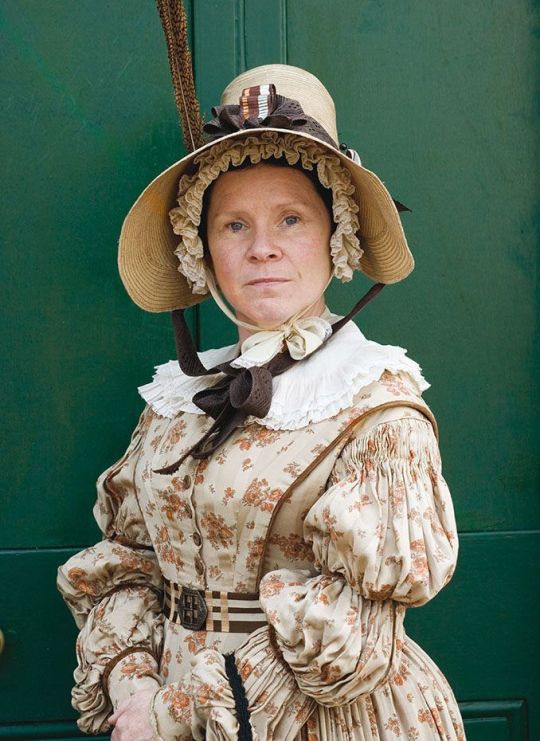
Mrs Grant/Jodie Whittaker 1,67 m
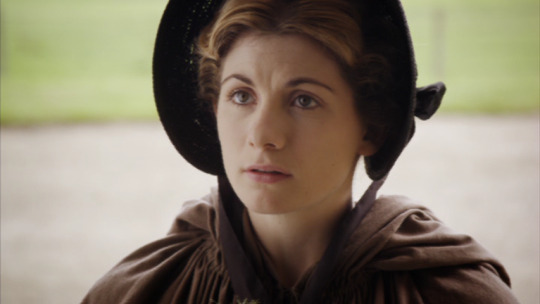
Dr Grant/Rory Kinnear 1,83 m
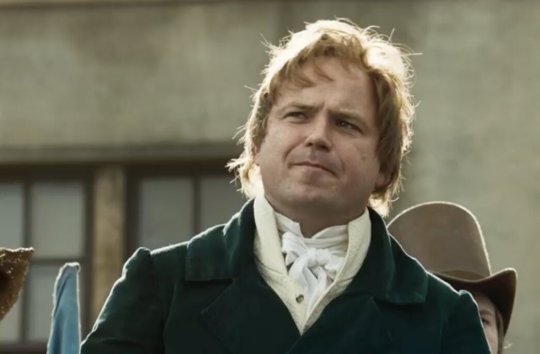
Tom Bertram/Sam Heughan 1,91 m

Maria Bertram/Gabriella Wilde 1,78 m


Julia Bertram/Rosamund Pike 1,74 m
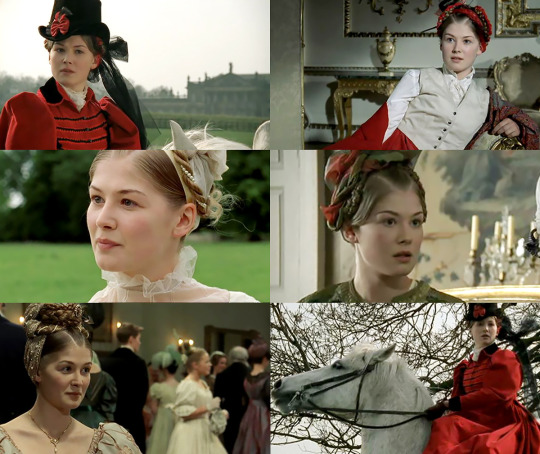
Edmund Bertram/Tom Hiddleston 1,88 m


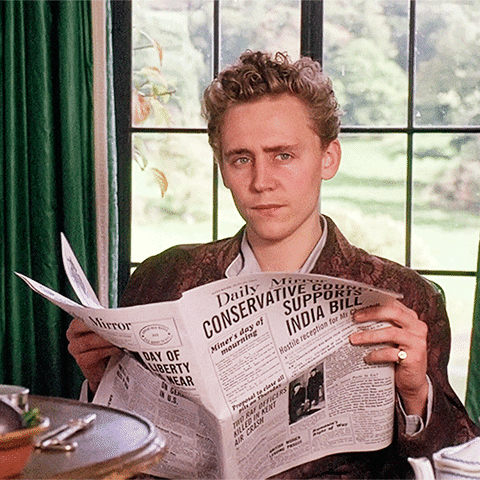
Fanny Price/Lily Dodsworth-Evans 1,69 m

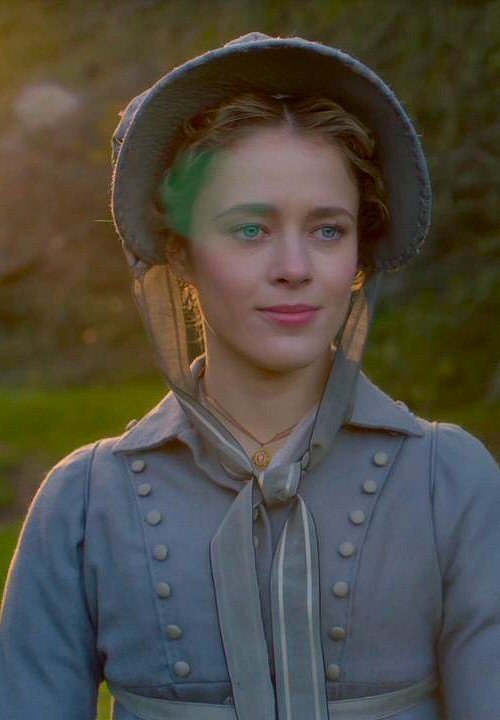

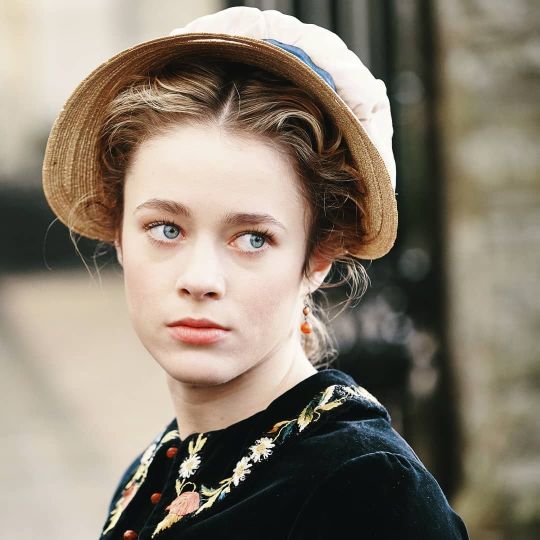
Mary Crawford/Jenna Coleman 1,57 m


Henry Crawford/Kit Harington 1,69 m



James Rushworth/Laurence Fox 1,90 m

William Price/Joseph Morgan 1,80 m
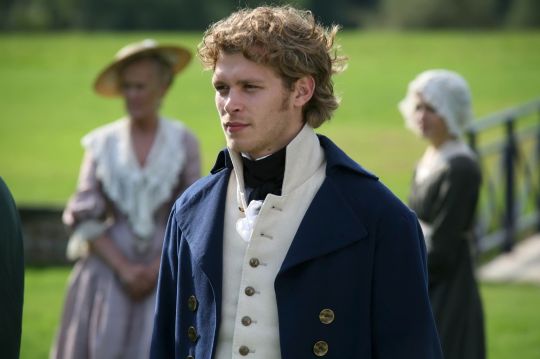
John Yates/Matt Milne 1,93 m
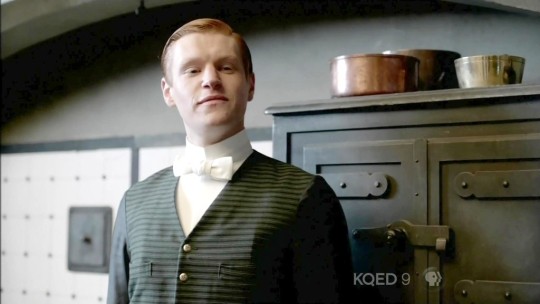
#mansfield park#henry crawford#mary crawford#fanny price#edmund bertram#fancast#i think it could've been a fairly realistic cast if their age had aligned at the right time#might switch yates and rushworth#loved Hayley Atwell but i find her a bit too tall#wanted a short Henry#immediately thinked of Kit who is quite plain without beard#jane austen
7 notes
·
View notes
Text
I always knew about Lewy’s defects; about his conceit, his pride, his insecurities, his selfishness and his ambitious character. I tried to never idealize him although when you doesn’t know someone personally you always idealize him a little. I never had any faith in his good qualities but I had a lot in his defects. I always thought that his conceit would prevent him from exposing himself to ridicule, that his pride will prevent him from displaying ungratefulness and inelegance, that his thirst for love and attention would make him appreciate and value the devotion that the Bayern’s fan had for him, that his selfishness would make him want to stay in a club where everything is organized around him and that finally his ambition would guard him against any desire to go somewhere else.
Also, for me, there always was a conflict in him between what I allegorically call his Bayern’s side and his Real’s side; a conflict between family, work, simplicity and glory... against exposure, marketing, ostentation and popularity... Lately I had the feeling that Bayern was winning the match and I don’t know if it was true or if it was just me imagining things because now it’s quite the reverse. Robert reminds of Mr. Crawford in Mansfield Park, he had a Fanny Price with Bayern and a Fanny Price who loves him. He has enough taste, intelligence and sensibility to admire her, understand her and love her but he is also unable to resist the temptation of leaving with a Maria Rushworth. Bayern, like Fanny could have offered long term happiness to Mr. Crawford, could have offered him something invaluable : eternity. He could have been deified; his name would have passed from generation to generation associated with respect, admiration and love; he would have been bathed in the eternal light of the glorious sun but he prefers the fake and brief lighting of the spotlights ! He needed to wait a few more years to obtain eternal glory but he doesn’t have the patience to wait. He wants immediate pleasure, immediate fame.
But despite all this, despite the fact that he disappointed me I still love him, i’m unable to held any true resentment against him, i’m not even sad anymore and I hate this. I want him to succeed wherever he goes, I can’t stand to see him sad or to hear people say that he never had any real talent and that all his achievements are just due to the fact that he was playing in a farmer league. But in an other hand I want his achievements to stay deeply connected with Bayern, I want him to understand that he couldn’t have been what he is without us and can’t be. I’m worried for him because no matter in which club he will go the fans will never sincerely love him, he will always be the enemy especially at Barcelona (he made them suffer so much), they will display exterior signs of affection but when he will retire they shall not cry or truly regret his departure, they will never keep any fond memories of him.
His departure from Bayern also alarm me because of someone else, and that someone is Thomas. During the last six years he has played for Robert, with Robert and because of Robert and I don’t how he is going to do without him. Lewy’s presence is what saved him in 2016/2017, what allowed him to reinvent his way of playing, is he able to change everything once again at this age? If Lewy had left in 2018 he could have done it but now, after all this years? On the pitch Robert is his landmark, his goal, his target, his everything... I’m so afraid that the end of Lewy at Bayern could also be the end of Thomas !
#robert lewandowski#fc bayern#my thoughts#don't read this#it's such a mess#I'm writing everything that I had in mind after today's events#and this is as weird as I am#i needed to get this out of my system#i'm rambling#i'm ashamed of myself#thomas müller#my shit#welcome to hell#what am I saying#but it hurts so much#I know that it's so stupid to love someone that I doesn't know so strongly#and to be so attached to him#i'm ridiculous
19 notes
·
View notes
Text
I had the idea to “redeem Mrs Norris” in part because I don’t understand Mansfield Park at all, and staring at its worst character seemed like a good way forward.
But, like, I was thinking —
When Maria leaves her husband for Henry Crawford, why exactly is Edmund so upset? It’s not because people got hurt. He doesn’t care about Rushworth’s feelings or pride; he doesn’t like Maria; Julia elopes, so she’s safe. Fanny’s not hurt by it — he knows she never cared for Crawford. It doesn’t appear to be about the family disgrace, either.
He says: “[Mary’s] is not a cruel nature. I do not consider her as meaning to wound my feelings. The evil lies yet deeper: in her total ignorance, unsuspiciousness of there being such feelings; in a perversion of mind which made it natural to her to treat the subject as she did. She was speaking only as she had been used to hear others speak, as she imagined everybody else would speak. Hers are not faults of temper. She would not voluntarily give unnecessary pain to any one, and though I may deceive myself, I cannot but think that for me, for my feelings, she would—. Hers are faults of principle, Fanny; of blunted delicacy and a corrupted, vitiated mind.”
So: he’s upset because Mary doesn’t know right from wrong, and because he was fooling himself that she did. (She told him. He just didn’t listen.) The morality of it seems to me to be less of an issue than the fooling-oneself, at least for the author, who … kind of … makes fun of Edmund, with her comment about him spending the summer sitting under trees and talking to Fanny… Also nothing bad happens to either Crawford. Nothing bad happens to anyone, in fact. Maria and Mrs Norris are sent to live together; but this is mostly on the order of being fired, isn’t it? They’re not punished for their sins — they don’t suffer a disfiguring carriage accident, or get boils, or get pregnant. Maria broke the rules, so Maria faces the consequences, and it’s Mrs Norris’ choice to follow her.
I’m tempted to think this book is about how a social structure based on birth rather than merit, in which an entire community is financially dependent on one man, makes Christian morals extremely difficult to follow. Because the whole thing started with Sir Thomas telling his friend that if he married his wife’s older sister, he could have the living at Mansfield — and he never let her forget her station.
I mean.
Most likely Jane wasn’t thinking that.
But I’m thinking that.
2 notes
·
View notes